#Process Instrumentation Market
Explore tagged Tumblr posts
Text
The global process automation and instrumentation market size is projected to reach USD 86.6 billion by 2027, at a CAGR of 5.5% during the forecast period.
1 note
·
View note
Text
Letters of Credit: A Lifeline for Global Trade
In the global economy, international trade is both an opportunity and a challenge. Opportunities come in the form of expanding markets, diversifying customer bases, and boosting profits. The challenges, however, lie in distance, regulations, currency differences, and most importantly, trust. One of the most effective tools used to bridge that trust gap is the letter of credit.A letter of credit,…
#Asia trade#bank guarantee#bank-issued guarantee#business growth#confirmed letter of credit#cross-border trade#distributor#emerging markets#European supplier#export#export documentation#financial instrument#freight forwarding#Global Commerce#global supply chain#import#international buyer#international deals#international shipping#International Trade#LC#LC process#Letter of Credit#Middle East trade#payment security#Payment Terms#secure payments#secure transactions#South America trade#supplier
0 notes
Text
Explore Texas Instruments Incorporated stock forecast for 2025–2029, with price targets, dividend insights, and investment tips. #TexasInstrumentsIncorporated #TXN #TXNstockforecast #Semiconductorstocks #Dividendstocks #Stockpriceprediction #Investmentopportunities #
#2025 stock picks#Analog and embedded processing market trends#Analog chips#Best dividend stocks for 2025#Dividend Stocks#Embedded processing#How to invest in Texas Instruments stock#Investment#Investment Insights#Investment Opportunities#Is Texas Instruments a good investment in 2025?#Semiconductor industry outlook for Texas Instruments#Semiconductor stocks#Stock Forecast#Stock Insights#Stock price prediction#Texas Instruments Incorporated#Texas Instruments stock#Texas Instruments stock analysis and price targets#Texas Instruments stock buy recommendation#Texas Instruments stock price forecast 2025–2029#TI stock analysis#TXN#TXN stock dividend yield and buyback policy#TXN stock forecast#TXN stock performance and competitive landscape
1 note
·
View note
Text
Process Automation and Instrumentation Market Growth Fueled by Rising Demand for Operational Efficiency and Accuracy
The Process Automation and Instrumentation Market is witnessing significant growth due to the increasing demand for operational efficiency, cost reduction, and enhanced production capabilities. Industries across various sectors are rapidly adopting automation solutions to streamline processes, reduce human intervention, and improve accuracy. The integration of advanced technologies, including artificial intelligence (AI), the Internet of Things (IoT), and cloud computing, is further fueling the expansion of the market. As global industries move towards digital transformation, the need for automation and instrumentation solutions continues to rise, making this market a crucial component of industrial advancements.

Rising Demand for Operational Efficiency and Accuracy
Industries are under constant pressure to optimize their production processes while maintaining high levels of accuracy. Automation solutions enable real-time monitoring, predictive maintenance, and data-driven decision-making, significantly improving operational efficiency. Automation and instrumentation systems reduce human errors, ensure consistent product quality, and enhance process control, making them indispensable for manufacturing and process industries. The growing need for precision in industries such as pharmaceuticals, chemicals, oil and gas, and food processing has led to an increased reliance on automation technologies.
Technological Advancements Driving Market Growth
The continuous evolution of automation technologies is a key factor contributing to market growth. The integration of AI, machine learning, and IoT in industrial automation has enabled predictive analytics and smart decision-making. Advanced sensors, robotic process automation (RPA), and cloud-based control systems are enhancing process efficiency and reducing downtime. With industries embracing Industry 4.0, the deployment of smart automation systems is becoming a necessity to stay competitive. These technological advancements are playing a crucial role in boosting market demand across various industrial sectors.
Increased Adoption of Smart Manufacturing Practices
Smart manufacturing is gaining momentum worldwide as industries seek to improve productivity and flexibility. Automation systems, combined with real-time data analytics, help manufacturers optimize resource utilization and reduce wastage. Digital twin technology, which creates virtual models of physical assets, is enabling companies to simulate, predict, and optimize operations efficiently. Additionally, the use of programmable logic controllers (PLCs) and distributed control systems (DCS) has enhanced production line efficiency, allowing seamless integration of automated workflows. The growing emphasis on digital transformation is driving companies to invest in automation and instrumentation solutions.
Growing Focus on Industrial Safety and Compliance
Regulatory bodies across industries are enforcing stringent safety and compliance standards, prompting companies to adopt automation solutions. Automated monitoring and control systems help industries maintain compliance with environmental, safety, and quality standards. The deployment of safety instrumented systems (SIS) and advanced control mechanisms reduces workplace hazards, ensuring a safer work environment. Industries such as oil and gas, chemicals, and power generation rely heavily on automation to monitor hazardous conditions, prevent accidents, and improve overall safety performance. The need to comply with regulatory standards is a major driver for the increasing adoption of automation and instrumentation solutions.
Rising Demand for Energy Efficiency and Sustainability
Sustainability and energy efficiency are becoming top priorities for industries aiming to reduce their carbon footprint. Process automation and instrumentation play a vital role in optimizing energy consumption and reducing emissions. Smart energy management systems, automated monitoring, and real-time analytics help industries improve energy efficiency while maintaining operational effectiveness. Renewable energy projects are also leveraging automation technologies to enhance power generation efficiency. As industries continue to focus on sustainable practices, the demand for automation and instrumentation solutions will further escalate.
Conclusion
The Process Automation and Instrumentation Market is being propelled by advancements in technology, increasing demand for operational efficiency, and the growing focus on industrial safety and sustainability. As industries continue to integrate smart automation solutions, the market is expected to witness substantial growth in the coming years. The adoption of AI, IoT, and predictive analytics will further enhance automation capabilities, making industrial processes more efficient, cost-effective, and reliable.
1 note
·
View note
Text
Process Automation and Instrumentation Market by Transmitter (Level, Pressure, Temperature), Analyzer (TOC, pH, Oxygen, Conductivity, Density, Toxic Gas, Turbidity, Hydrogen Sulfide), PLC, DCS, SCADA, HMI, MES, Industry - Global Forecast to 2029
0 notes
Text
Europe Process Instrumentation market Overview
Europe Process Instrumentation market size is forecast to reach $9.37 Billion by 2030, after growing at CAGR 3.25%during the forecast period 2024-2030.
The demand for process instrumentation in Europe is growing widespread adoption of Industry 4.0 principles, characterized by the integration of digital technologies and automation in industrial processes. Additionally, the integration of Industry 4.0 technologies, such as IoT and AI, is promoting automation and data-driven decision-making, elevating the need for advanced instrumentation. The desire for improved operational efficiency, product quality, and reduced downtime also fuels this demand. Furthermore, ongoing technological innovations, including wireless and remote monitoring solutions, are making process instrumentation more accessible and effective, fostering its increased adoption in the European market.
👉 𝗗𝗼𝘄𝗻𝗹𝗼𝗮𝗱 𝐒𝐚𝐦𝐩𝐥𝐞 𝐑𝐞𝐩𝐨𝐫𝐭 @ https://tinyurl.com/mrytxka8
#Europe Process Instrumentation Market Share#Europe Process Instrumentation Market Size#Europe Process Instrumentation Market Forecast#Europe Process Instrumentation Market Research#Europe Process Instrumentation Market Treads#Europe Process Instrumentation Market Application#Europe Process Instrumentation Market Growth#Europe Process Instrumentation Market Price
0 notes
Text
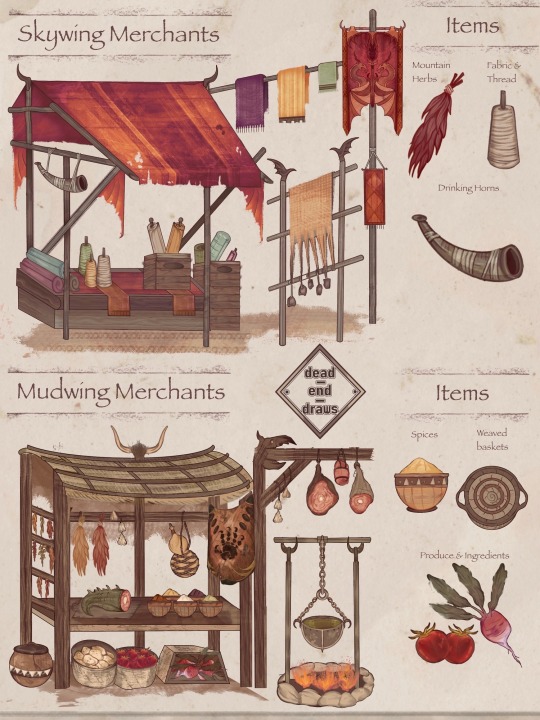
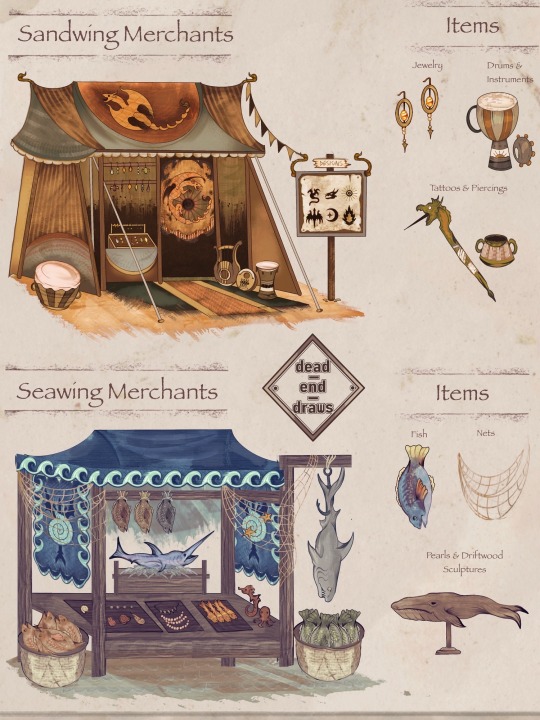
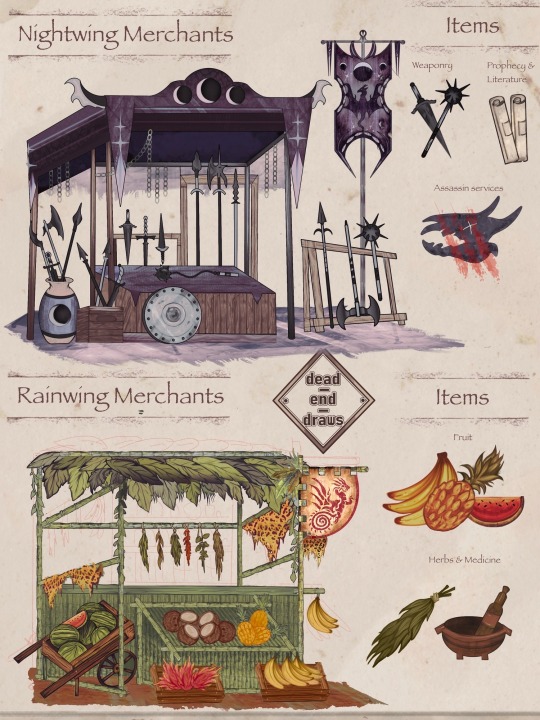
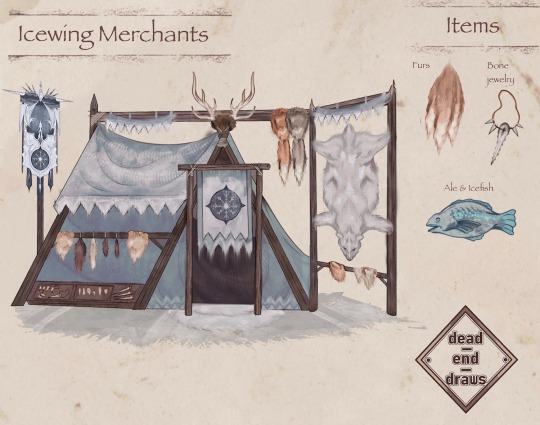
WOF tribe Merchant/Trading booth concepts:
Hey folks! This one was the recent winner of this WOF poll, so here’s my concept art that headcannons trading in Pyrrhia.
Read below cut for close-ups of the individual booths + the thought process / headcannons behind the design choices: 👇
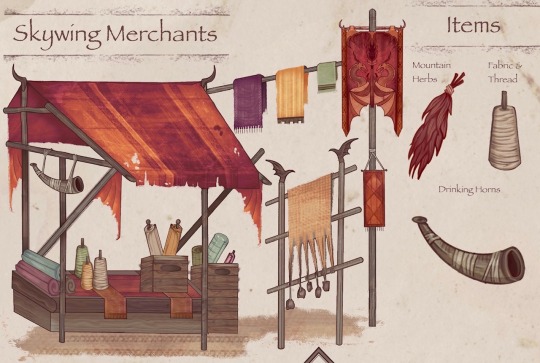
Skywings: The Sky Kingdom’s mountain ranges provide plenty of pasture for raising sheep. As such, Skywing shepherds benefit from traveling to sell their wool, dyes, fabric, and woven tapestries. Many of these merchant tables also include herbs grown exclusively in the mountains, or ibex drinking horns that can be strapped on a dragon’s shoulder & carried in flight.
Along with goods, Skywing merchants may offer sewing services to fix tears, burn marks, or other fabric damage. They are sought out for their quality clothing, and most fabric across Pyrria originated from a Skywing’s talons.
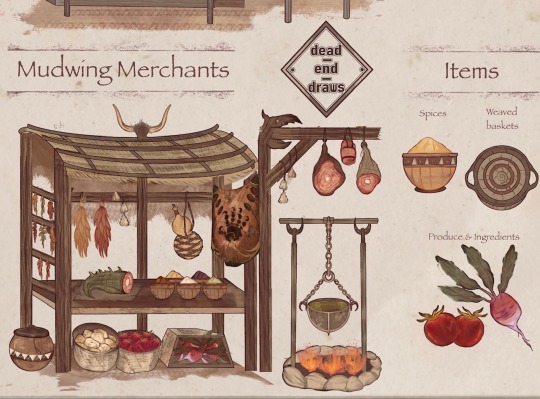
Mudwings: Mudwings’ abundant food & cooking skills are envied almost anywhere in Pyrrhia. Their swamps have fertile soil, responsible for hosting diverse crops which can be purchased as produce at merchant stalls. For those lucky enough to find a traveling Mudwing merchant, the promise of a delicious dish can be whipped up and served at the stall in no time. Along with produce goods, Mudwings sell weaved baskets, spices, and cooking ware.
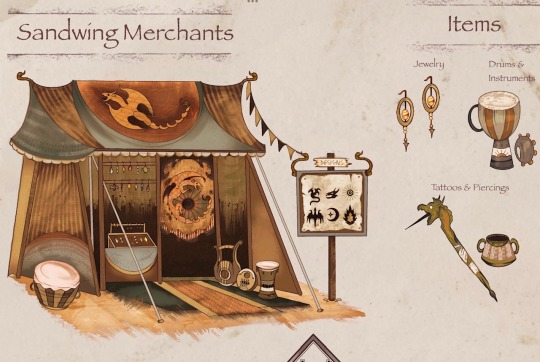
Sandwings: Sandwing booths offer luxuries of the desert: It’s most common to find accessories such as gold carved jewelry or musical instruments such as drums, lyres, & mandolins for sale. Though, even more sought out across Pyrrhia is Sandwing tattoos/piercings, which are done within the merchant areas. Ink etchings on papyrus paper are stationed outside their tents to showcase designs. All which can be selected, and poked into the skin with a tapping stick and plant dye ink by a trained talon.
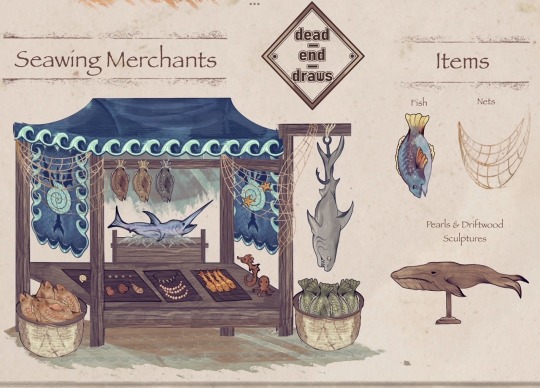
Seawings: SeaWings sell a variety of ocean related goods; taking a share in the fish market with Icewings. Outside of food, there are den decorations like driftwood carvings, accessories such as seashell & pearl jewelry, and rope nets weaved by expert Seawing sailors. Some Seawings even sell fishing equipment, canoes, or offer sailor knot tying instructions to curious dragon buyers.
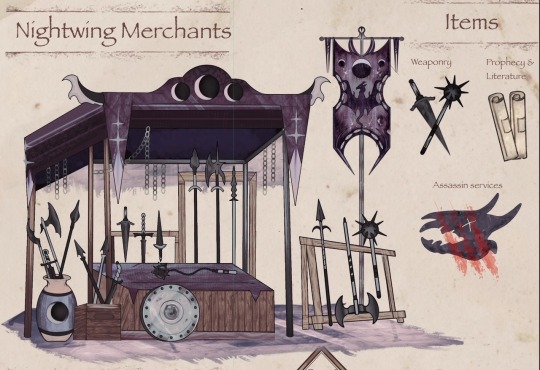
Nightwings: During the war, it was near impossible to find a Nightwing merchant. Most refused to participate in merchant territory, mostly as a way to keep up with their tribe’s mysterious nature.
Though in the more shady, unground parts of the market you can buy from a huge selection of obsidian weaponry, the sharpest in Pyrrhia. No one knew initially how Nightwings smithed so many weapons, or why, until their secret volcano kingdom and the intention to invade the rainforest was discovered. Then forging armor & weapons became clear. Along with a vast armory, for the right price, some Nightwing merchants offer Prophecies & Nightwing Literature (not always guaranteed to always be reliable) and assassin services as well (very reliable).
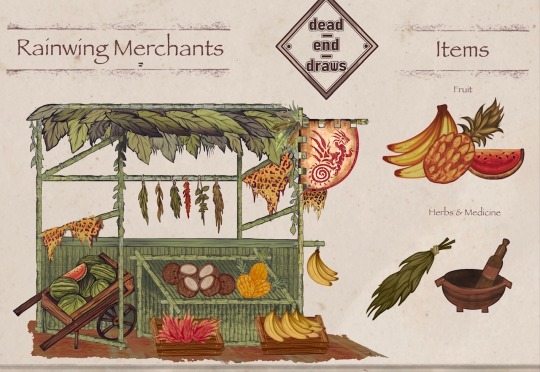
Rainwings: Though Rainwings haven’t been part of Pyrrhia trading for years, they have a vast hold on dragon medicine. An apothecary of herbs, salves, and remedies are all offered for various ailments due to the rainforest’s abundant resources. Along with medicinal goods, many Rainwings are fruit vendors, promising to any hesitant meat-eating dragons that such an array of flavors isn’t to be missed. Though, their fruit selling pitches often fall flat to most other predominantly meat-eating tribes.
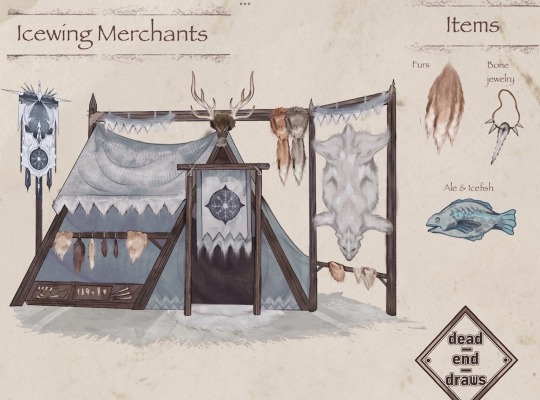
Icewings: Icewings have everything a dragon could need to brace the cold, with a selection of goods only found in the most frigid regions of Pyrrhia. Furs, bone jewelry, and fresh fish (thanks to frost breath) are served on ice. Though Icewings themselves don’t require fur to withstand the cold, it’s considered fashionable and common in upper ranks to wear fur as a status symbol. Since metal is hard to smith without fire & in cold temperatures, fur and bone are more accessible to Icewings for clothing statements.
#art#illustration#bookart#wings of fire#wof#dragon#concept art#concept design#dragons#dragon art#wings of fire art#wingsoffire#wings of fire fanart#wof art#wof headcanon#wof tribes#skywing#Seawing#Mudwing#sandwing#rainwing#icewing#nightwing wof#nightwing#wof fanart#wings of fire headcanons#illustrative art#worldbuilding
4K notes
·
View notes
Text
Writing Notes: 10 Uncommon Magic Systems

These examples of unique magic systems might pique your curiosity and inspire your next fantasy epic.
Color Magic: Harnessing colors to invoke specific spells or effects.
Sound Magic: Crafting spells through vocal tones, vibrations, or musical instruments.
Time Magic: Manipulating the past, present, or future, often bending the laws of physics.
Egoic Magic: Altering one's sense of self or emotions to use as a magical conduit.
Manufactured or Artificial Magic: Magic crafted or produced through synthetic means (e.g. via objects or alchemical processes).
Nothingness Magic: Conjuring voids or vacuums, often manifesting as spatial anomalies.
Glass Magic: Manipulating glass to create barriers, projectiles, or even complex machinery.
Astrology-Based Magic: Drawing powers from celestial bodies or zodiac signs.
Fate Magic: Influencing destiny or chance to manifest predetermined outcomes.
Bio-magic: Utilizing biological processes or traits for supernatural effects.
Incorporating lesser-covered categories of magic can set your story apart in an oversaturated market, helping you carve out your distinct niche and voice. Source
More: On Fantasy ⚜ Writing Notes & References Writing References: Worldbuilding ⚜ Plot ⚜ Character
#on writing#fantasy#worldbuilding#writeblr#writing inspiration#writing ideas#writing inspo#creative writing#writing prompt#magic#writing advice#writing tips#light academia#dark academia#writing reference#nc wyeth#realism#art#illustration#writing resources
379 notes
·
View notes
Text
you better make me better (pt. 4)
agatha harkness x fem!reader (+ rio is here now)
A strange woman, who clearly shares a sorted history with Agatha, interrupts your moment together. Agatha asks for your help to deal with Death, and you're more than happy to oblige.

other parts: 1 2 3 4
word count: ~4800
warnings: 18+ MDNI, dehumanization/objectification, exhibitionism/voyeurism, fingering, "good girl" and "pet", tiny bit of degradation and praise, jealousy, mention of death, brief description of a corpse, smut
author's note: it has been a bit! sorry for the delay but i hope you enjoy this part and let me know if you'd like more. also thank you for all your help, you know who you are.
tag list: @lanfear-is-my-darkmistress
You’re still catching your breath, Agatha’s eyes making a meal of your every coy adjustment, when a sudden strident sound overwhelms your senses from all sides.
It’s akin to a ringing in your ears, but with a bassier root noise that vibrates your jaw in its sockets. The higher pitches seem to claw the inside of your brain causing every hair on your body that isn’t already at attention due to the chill in the air, to stand on end. Punishing blares somehow surround you while also feeling like they are coming from inside your skull, making it clear that this isn’t simply some terrible musical instrument foreign to your ears, but rather something of an otherworldly origin.
Confirmation that you’re not alone in this strange experience comes with Agatha’s head whipping to face the clearing behind her. Her long curls sting your cheek with the force that they slap against your face in the proximity, but you don’t mind. The scent of her hair meets your nose fully in the process and you inhale the biting of a citrus peel that teeters on bitterness, but remains mouthwatering, mixed with something deep and earthy like black tea leaves with a hint of peppercorn.
Another rush of wind disrupts your analysis as it carries the overpowering smell of juniper into your nostrils that causes you to chase after the retreating scent of the woman before you. Juniper, you find odd, as you hadn’t observed any such trees in your trek through these woods.
“Shit!” Agatha swears, eyes scrunching up as if suddenly remembering, upon arriving home from the market, that she’d forgotten to buy the milk she needed.
“What is it?” You ask worriedly, trying to draw the woman’s attention back to you, to no avail.
Rather than a proper answer, you instead see the feminine silhouette of a figure clad in a long black bombazine mourning dress, trimmed in a deep green shade. She steps from the treeline opposite the two of you, a long torch in hand that roils with bright green flame, casting harsh shadows against the delicate features of her face.
Some preternatural awareness tells you that the ringing in your ears, which has only minorly subsided, as well as the new scent added to the already woody air, has come from her. A pit settles in your stomach as you scan black hair and dark eyes from a rapidly closing distance. You can’t put your finger on what about this seemingly innocent woman, witch rather, if her colorful flame and entrance “music” was any indication to go by, is sending such bolts of doom into the core of you with a single glance.
A glance from you, that is, as this woman, in all her approaching, has not spared a flicker of her vision for anything but the one that still brackets you against the tree.
Just as the awareness of Agatha’s maintaining hold crosses your mind, she is releasing you, instead turning to face the other witch head on, as she now only stands feet from you both. You glower to yourself at the loss of contact for a split second before Agatha’s hand comes up to hold your left hip in place, as if making sure you stay behind her. The small gesture of protectiveness sends a thrill through you as well as worry at the prospect of what could possibly cause Agatha Harkness to show any measure of fear.
“Agatha,” the green clad woman speaks her name like a blessing and a curse.
“Fancy seeing you here. Not like you to stick around at the scene of the crime…anymore, that is.” The black haired woman says like the two are sharing a secret you are definitely not privy to.
Though you can’t see Agatha’s face, you can feel the slight twitch of her fingers against your hip at the final phrase before she speaks back.
“Seems I lost track of time, you know how that is.” She returns in a ridiculing tone you’d watched her use with your coven, though now with a more personal intent that stabs the words into the air.
The woman holding the torch nearly pouts at the response, completely nonplussed by whatever secret message is being communicated.
“Shame, here I was thinking you wanted to have a bit of fun.” The stranger replies teasingly, such that you feel both a twinge of jealousy in your gut and utter fascination at the history between the two witches.
“Ha! Actually, we’ve already had quite a lot of fun.” Agatha retorts with a laugh, the hand not holding you gesturing playfully over her shoulder to where you stand. You flush with pride at what borders close enough to praise, as well as the thought of her using you as some sort of brag to this woman she clearly has some significant past with.
Your mouth runs dry as you move your eyes from where they have been fixed at Agatha’s back to gaze at the woman whose name you still haven’t caught up close. She’s looking over you like she truly hadn’t even noticed there was a third living person in the general vicinity, though you find that hard to believe.
Her eyes case you in an instant, running over every visible inch and lingering for a moment over what you know is an already forming bruise that sits in the dip of your right collarbone from Agatha’s earlier exploration. The spot almost burns at the attention and you wonder if it’s just in your head or truly some magical product of the other woman’s glare. In all her searching though, deep brown pools never lock to yours. Not in a shy or anxious way, but rather in the way one might not think to look into the eyes of an animal, feeling no need to address it as conscious.
With every near pass of her gaze to yours, your heart pumps faster in your chest and you’re not entirely sure why. Part of you wants desperately for this woman you don’t even know, to acknowledge your personhood, while another loathes the potential loss of the tension forming around her continued neglect.
“What is this?” The woman asks, clearly referring to you, but looking to Agatha as she starts to further close the already small distance. Her eyes, which you haven’t been able to look away from, blaze slightly and nostrils flare in resentment as she does.
“Not of your concern. She’s alive.” Agatha fires back pointedly and the statement causes you to internally quirk an eyebrow, trying to deduce the exact implication in it. She gives a half step to her left in order to guard you more fully from the other woman’s advance.
This doesn’t seem to deter the darkly dressed witch at all as she steps up to Agatha and peers over the shorter woman’s shoulder to get a better look at you, her face now only inches from yours. A tickle spreads along your hairline and cheek where she scans your features, though she does not touch you. One hand remains at her side while the other extends behind her to keep the flamed torch at bay.
“Hm,” she starts thoughtfully, “it’s pretty.” The sweet word takes the shape of an insult in her mouth.
“Don’t you have a job you’re supposed to be doing?” Agatha asks accusatory, once again causing your mind to run wild chasing after its meaning.
“Can’t shirk your duties now.” She continues, the words being spit out like poison in her mouth.
The final word is heavy as lead and files itself away in your head as a possible piece in the boundless puzzle that is the dynamic between these two women. Two dark eyebrows lace together for a split second in what looks like a hurt expression on the stranger's face before she schools her features back to that of contempt and shifts to her heels to meet Agatha’s gaze again.
“Wouldn’t dream of it. Especially after you’ve left such a gracious offering.” She replies with a wink and a wicked smile that you feel causes Agatha to tense even more in response to.
An offering, you wonder to yourself, images of altar gifts and tithe collections spring to your mind along with the memory from minutes ago of that purple halo surrounding Agatha’s head. You’re unsure how long you’re lost in thought, but before you know it the odd woman is stepping away from the two of you and approaching the splayed, grey-ish corpse of your coven leader at a casual stroll.
“What’s she-” Your question is cut off by Agatha’s interjection and another squeeze to your hip, still not having turned from her position facing away from you.
“Quiet, pet. You’ll see.” She responds in a tone that is half harsh and half very far away, gaze following the black-haired woman’s movements as she stoops down to the face of your former superior and traces the sharp, black nails of her free hand along the side of her hollow cheek, lazily.
From this angle, you can no longer see the faces of your coven leader or the one who leans down to touch her, but your breath seizes in your throat as a stirring starts to come from the body that has been lying still and lifeless for some time now.
Her crooked limbs twitch and spring to life as though waking from a fitful dream; it’s all you can do not to let out a yelp of fear at the apparent resurrection. Agatha’s nails digging into your hip are no longer enough to ground you to the situation, and before you can decide otherwise you are wrapping your arms around her waist from behind and burying your face into her left shoulder blade to shield you from the horrible sight.
A grateful calm washes over you when the witch doesn’t push you away and even relaxes marginally into your embrace, especially after her previous chiding. The irony isn’t lost on you that this image is somehow more frightening than that of all the bodies of those you’d known most of your life dropping motionless to the grass not too long prior.
It isn’t until the previously diminished oppressive sound creeps back into your senses that you’re able to tear your eyes back open and peer over Agatha’s shoulder at the view before you again. The reverberating noise that rattles your skull and presses on your eardrums blocks out the details of the conversation that is clearly being had between the two witches who now stand several yards away. Even from this distance you can see your coven leader’s face has been returned to its former health and fullness. She doesn’t seem to notice you, despite you standing in her direct eyeline.
All of this feels suddenly surreal again, as if you’re moments from waking from a dream due to your realizing its falsehood. That is until your eyes travel down the bodies of the pair to the ground below, where you see the clear image of your coven leader’s form still drained and stiff in the same position you’d remembered her in.
Your breath starts to come quicker as your eyes flick rapidly between the version talking to the darkly dressed woman and the one with sallow, sunken features unmoving in its permanent rest. Panic starts to well up within you and stinging tears brim at your eyes in your confusion, that growing sound turning from a droning to a screeching in your ears that you would claw at if you thought it might help. The burn you feel growing across your brain might very well be your neurons firing in succession to try to make sense of what it is you are looking at.
The answer doesn’t snap into place until a darkened doorway appears between two trees at the wave of the strange woman’s hand, spilling fog the color of jade onto the ground in front of it. She sends one last glance over to Agatha before stepping through it after the retreating lively version of the inexplicably dead woman who once led you and your fellow witches.
Your panicked breaths cease completely at the reveal of the sudden change in her visage as she turns. What was just moments ago the elegant, if slightly languished features of a woman have now been replaced by a shadowy and vacant skeletal structure; bone white brow and cheekbones protrude over exposed teeth and a jaw that fixes her expression into an unrelenting mockery of a grin that strikes the identity of the formerly nameless woman into your heart.
The ringing in your ears reaches a fervor that seems will not let up until you admit what it is you now know to be true. The words leave you without your express permission, but as if breathing and releasing them are cosmically tied actions.
“She is Death.”
“Yes, very good.” Agatha responds, louder now that Death and the ghostly figure have vanished into the summoned portal, or perhaps it just seems that way with the sudden pause in the ambient noises that seem to follow the primordial being.
The way she draws out the vowel on the confirmation brings a condescending tone to the perceived praise at your deduction skills, as if she’d been waiting impatiently for you to put two and two together. This interaction feels completely divorced from before, when she’d lit up at your realization of what she wanted, your pleading. It takes the wind out of your sails momentarily as you cast your eyes down to the dirt in shame.
“Oh, come on, don’t pout. It doesn’t look good on you.” She twists in your grasp before placing a hand on either side of your cheeks to roughly raise your face back to look at hers. You reluctantly meet her eyes and find them still slightly put-upon, but more satisfied with your following of instructions. They search you with a consideration, as if weighing her options.
“You want to help me with something?” She asks, almost patronizingly in the way she clearly already knows the answer. You would feel shame if it weren’t overridden by just how much you do want to be useful to her. You nod, measured and desperate, and the smile she gives you melts away your fears and is well worth whatever it is she’s going to demand.
“Good girl.” She admires, hands supporting the weight of you melting into them at the title. Maybe, you think, you can endure the bite of her admonishments for how much sweeter they make the taste of her following commendations.
Her hands release your head once you’ve gained your composure back enough to return to an upright posture. Luckily, there’s not even enough time for you to mourn the loss before they have grazed down your sides and are maneuvering you around by the waist.
Agatha silently walks you the few paces back over to the center of the clearing where you had shared your first kiss such a short time ago. The determination on her face is fascinating but you think better than to ask her too many questions, especially after her response to the latest one.
You stand with your arms awkwardly at your sides, letting her shift you a step to the left or right, a glance over your shoulder allowing you to deduce that she’s trying to find the perfect angle directly in view of the still-swirling doorway that Death has left behind. The witch hums in delight when she’s found the perfect spot for you; you bite your tongue in favor of mentioning that you’re almost certain this is the spot you started in.
“Perfect!” She declares, clapping once to seemingly applaud her own curious work.
“Now, lay down.”
“What?” Your mouth asks before your brain can remember to nix any questions.
Jumping into action before she can answer, or more likely scold you for the inquiry, you drop to the soft grass and fan your skirt around you to cover your legs from the chill of the blades swiping along them. You try to maneuver your hair to do the same, but the poking sod snakes its way along your neck and face and you already feel somewhat itchy. You push the need to fidget away and focus every thought on being still, being good.
Agatha watches you get comfortable with a smug sort of grin and you can tell the pieces of whatever plan she has brewed up are coming together.
You admire her for a moment from your worm's-eye view. The contrasting light cast by the starry night and sickly green magical fog strikingly paint her already stunning features and that fear you’d noticed at Death’s arrival has somewhat quelled with the giddiness in her at this mysterious plan. You’re happy for it, even if you have no idea what to expect next.
She must catch your trailing stare that now dances shamelessly along the taut column of her neck, because the toe of her right shoe starts to playfully ghosts along your ankle to shift your legs further apart and ride up the hem of your dress just slightly. It’s an innocent enough action, but so soon after the previous events of the evening makes it enough to send shockwaves through your core in anticipation. It does little to tamp down the improper thoughts that the image of her long, exposed neck have already started brewing as well.
Your eyes drag up to Agatha’s face in delighted curiosity, only to find her staring off into the portal. It’s almost as if she hasn’t even noticed her own toying movement against your leg.
She looks like she’s waiting for something, and you’re about to ask her what it is when your train of thought is cut off by action behind and in front of you.
Having thought her request for help would involve some sort of ritual or spell, you’d been silently mourning the more pleasant section of the evening that seemingly came to an end with the arrival of the lady of Death. However, when said umbra-clad woman finally steps back into view through the magical vessel just ten feet from your head and Agatha drops to her knees between your spread legs at the arrival, you know it has only just begun.
The facial expression upon the returning woman’s face, whether it’s surprised or even there at all, is lost to you as your gaze is locked on the one kneeling between your legs and the way that the cloth covering you ripples as her cool, searching hands crawl up your body from beneath it. The chill of her fingers causes you to inhale sharply through gritted teeth, your lower half still damp with sweat and furnace-hot from your earlier activities. Your eyes flick between Agatha’s face and her moving hands in delighted confusion, whatever she is doing now at least taking the shape of something you desire.
Perhaps, you think, you do hear the faintest intake of breath from behind you at the obvious bulge in the fabric as Agatha’s left hand briefly hovers just over where you want her most, and it’s the only sign of this display having any effect on your newfound company until she speaks. It won’t dawn on you until much later that Death herself taking a breath is probably about as shocked of a reaction as they come.
“Agatha.” Death uses her name now as a warning, as if cautioning a child from playing a cruel trick.
Does that make you the trick?
The thought of it should, you know, breed a certain amount of indignity in your heart. The way Agatha’s looking at you, however, like you’re just the suit she needed to pull in a high-stakes game of cards, causes any humiliation you’d have about the scenario to evaporate. While she may be using you, she's using you.
“Rio…” Agatha’s mocking return of the woman’s name trails off, so pointedly not looking at your only other living company, if you can call her that. Instead, her eyes rake over your body as your muscles tense and roll against both her hands that finally settle to grip your bare hips beneath your clothing. Her strong fingers work to still the slight rocking against nothing that you hadn’t even realized you’d started doing.
Rio, you think. At learning what you assume is the more human name used by the entity, you can’t help but turn over your shoulder to finally take her in once again with your new knowledge in mind. You breathe a quiet sigh of relief at the confirmation that you’re not being met with exposed bone, but a very human face looking on to the scene before her in intrigue mixed with simmering fury.
The fact that she still actively avoids meeting your eye as you lay before her makes you run both hot and cold at once. She surveys you like one might regard a piece of furniture in a room and her gaze only reaches as far as your exposed, flushed neck before making a path right back down your supine form. It’s a level of supposed disinterest that can only be achieved through truthfully great curiosity.
“You don’t w-” You hear the beginning of Rio’s continued attempts at reasoning but they are lost to the sound of your own loud gasp that tears from you unexpectedly.
Before you know it, there are two fingers buried in your wet heat for the second time tonight, the remnants of your first orgasm still enough to allow little resistance for Agatha’s reentry. You hadn’t even noticed her left hand leave your hip in your contemplation over the spectator in your midst, giving you no time to brace for the intrusion or try to stifle the loud noise that came of it.
Her fingers don’t let up as they set a slow, but deep, curling pace that has you making a concerted effort not to instantly start writhing on the ground beneath you. A hot blush fills your cheeks when you find Agatha grinning at you as her hands work you over, your brows knit up and teeth sink into your bottom lip in your effort to keep some semblance of your composure.
Of course you’d realized some aspect of Agatha’s intentions moments ago, but the actual experience of having her buried up to the last knuckle inside you as a near perfect stranger watched on, was something else entirely. Especially when that stranger was Death herself.
“Sorry, what was that?” Agatha cheerily asks Rio, finally turning to meet her eyes as if she is simply knitting a sweater and not dragging you closer and closer to the edge of ecstasy with every thrust of her hand.
“Couldn’t hear you over the…” The casual chuckle in her voice and the way she raises her eyebrows once in emphasis as if to say ‘you know’ almost makes you want to laugh right along with her in your delirious state, having gone from quiet contemplation to whimpering mess in mere moments.
“Oh, my mistake! Should I talk louder!?” Rio replies, much louder now and with a naked anger in her voice.
Agatha’s pace quickens right along with the volume of the other woman’s exclamation, slamming that spot inside you in such rapid succession that you can’t help but let out another loud moan that trails on longer than you intend. This only seems to delight the woman fucking you all the more.
“That was a bit too much, honey!” Agatha fires back amusedly, matching Rio’s theatrical shouting. For a moment you think she’s referring to your moans and you flush with embarrassment before realizing her true intent.
Something about watching the two of them argue, both with focus locked on the other so intently that Agatha’s ministrations between your legs are the only indication that either of them even know you’re there, has somehow brought you hurtling towards climax much faster than before. She isn’t even touching your clit, but that doesn’t seem to matter at the moment. A little bit more of this and you’ll be gone.
The thought of coming apart around Agatha’s fingers like this, while she might not even notice it’s happening, somehow strikes both a feeling of dread and carnality through every inch of you.
“Oh, you think?” The woman standing just a few yards behind you questions with irritation that now meets your ears with an undeniable elation laced within it. This is thrilling Death.
You rock your hips even harder at the thought, partially involuntarily and partially to try to signal to the otherwise engrossed women that you’re moments from release. You’re torn at the concept of interrupting the display, canines digging so deeply into your lip to stifle your moans that you taste iron on your tongue.
Agatha’s earlier teaching also springs to the front of your mind, but you can’t muster any “please”s at the moment. In fact, you’d rather drag this out longer than beg for more. The dark haired witch driving into you clearly has other plans, though, ones that involve her yanking you down even harder onto her fingers by your right hip all while she continues looking past you and maintaining her conversation.
Your eyes roll and your head drops back at the somehow redoubled pleasure coursing through you. You can’t even moan now, mouth open in a silent scream. If this isn’t Agatha giving you the signal of her permission then you’re not sure of anything anymore.
“Yeah, I do.” She says with a sarcastic pitying tone and nod of the head.
The way she drags in and out of you, her rhythm and angle never faltering in her performed passivity, feels almost too good. The growing pressure below your belly is going to snap at any second. As much as you want to hold onto this deliciously sinful feeling for a while longer, with Agatha’s permission granted and your body screaming at you for its much needed release, you give yourself over to its whims.
“Better than not enough.” Rio bites back in a way that you know is meant to strike you, despite your back being to the woman.
And it does, a spike of shame lances your heart in the exact same moment that you utterly come undone. If your first orgasm crashed over you, this one tears out of you. You can do nothing else but let the warm liquid gush from you to coat Agatha’s waiting hand as you release a string of guttural groans and high pitched gasps of pleasure, as well as embarrassment, that mingle in your brain to create an intoxicating concoction.
Agatha’s fingers don’t cease for several more seconds, aftershocks causing your hips to jump and force her even further into you for a moment. You start squirming at the overwhelming sensation, words failing you as you bat her hand weakly. She stops her movements, but leaves the digits within you for the time being as you come down.
This is not an out of body experience like before, but a thoroughly grounded one. You feel the heaviness of satiation in every limb like gravity has suddenly become stronger around you and you figure if you weren’t already laying down you would’ve collapsed by now in pure fulfillment.
“See, it’s done already. Shame.” Death tuts dismissively down at you, eyes floating somewhere around your middle.
“Don’t worry, Agatha. I’ll just get finished up here and we can have some real fun.” She continues.
Agatha laughs darkly at that, but even you can hear the thread of longing within that threatens to rear its head.
“I wouldn’t be so sure. You go ahead and do your ��work”, we’ll manage just fine.” Agatha starts, releasing your hip to make air quotes with her right hand while the other remains inside you.
At Rio’s assumption of your inadequacy and Agatha’s signal for more, you find a renewed vigor throughout your body and push up on your elbows into a more upright position.
“Please.” You plead in the most desperate voice you can muster, and you know from the look on Agatha’s face that you’ve done the right thing.
Just out of the corner of your eye you can see Rio, who must’ve taken a few paces forward in the time you were otherwise occupied with your waves of euphoria, as her eyes flare at your word and Agatha’s gleeful reaction to it. She turns pointedly away and starts towards one of the other five bodies.
It sends a chill down your spine that, in this moment, Death is jealous of you.
#agatha harkness#agatha all along#agathario#rio vidal#agatha harkness x reader#kathryn hahn#agatha x reader#agatha all along fanfic#agatha harkness x you#agatha harkness x fem!reader#wlw#agatha harkness smut#agathario x reader#rio vidal x reader#rio vidal smut#agathario smut#x reader smut#agatha x rio#agatha x you#agatha smut#rio smut#aaa fanfic#agatha all along smut#agatha harkness x reader smut
157 notes
·
View notes
Note
this is probably shaped by my limited frame of reference, but im really fascinated by witnessing the real-time development of adhd as a diagnosis. people attribute so many symptoms to it now or maybe they always did? i was wondering if you have any thoughts on what is the use of adhd specifically as a category within psychiatry. I'm esl so sorry for any confusing wording
no you're right imo; diagnostic categories are always somewhat in flux ofc but ADHD is one that has seen a particularly pronounced shift in the last couple decades. obviously this is multifactorial but my observation goes something along these lines:
'hyperactivity' has been dx'd in children since about the 1950s (also when Ritalin hit the market) but the ADHD dx doesn't really take off until the 90s (also when Adderall, a 2nd-gen reformulation of the 'obesity' drug Obetrol, hit the market). so, it's not all that surprising that 20 years later you see increased patient awareness of the diagnosis, increased popular interest in it, and shifting / expanding ideas of what it means and what ADHD 'is'. it's a relatively young dx.
part of the reason it's young is because it's basically a 'biopsychiatric' dx, meaning it diagnoses certain behaviours as being a 'brain problem' rather than having social causes or context. in practice this is complicated because psychs do use pharmacological approaches in conjunction with psychodynamic ones all the time; nevertheless, the central promise of DSM ADHD and its pharmaceutical treatments has consistently been that the ADHD subject has a physiological, neurological disorder / dysfunction / aberration, and that the drug treatments on the market fix it. that none of this is actually empirically supported is conceptually inconvenient and entrenched by the research process.
the biopsychiatric narrative is worth paying attention to because the context here is one in which it has become commonly accepted that behavioural 'disorders' and affective distress of various kinds can be, basically, either of pure biological origin, or else Your Fault. in the case of childhood hyperactivity, Your Fault historically also included Your Mother's Fault; part of the reason many mothers embraced Ritalin in the 50s and 60s was because the proffered pharmaceutical narrative explicitly challenged the idea that these mothers had done something 'wrong' to result in their (mostly) sons exhibiting disruptive and hyperactive behaviour.
this dichotomy of biology vs personal failing is very overtly present in quite a bit of discourse around ADHD today. if it's my brain being 'wrong' or different, then it's not something I've done wrong but a disease with a simple chemical fix. in this context I don't think it's surprising at all that a lot of popular and patient conceptions of ADHD have seen a considerable widening over the past few decades. often people like to blame this on pharmaceutical companies, and it's true that industry benefits from these discourses and frequently invests in them (eg, via instruments like ADDitude mag). however, that's a pretty simplistic explanation on its own and doesn't really account for the ways in which patients and potential patients also find this diagnostic category personally useful, for reasons ranging from identity-formation to the desire to access prescription amphetamines. ADHD increasingly shows up as a biologised explanation for behaviours ranging from 'eating too many sweets' to 'postural sway' and so on. you can see in such examples how invoking the idea of an aberrant ADHD brain is both reassuring to people who have been made to feel ashamed of certain behaviours, and provides a sense of shared identity and community with others.
all of this is to say: I don't find it surprising at all when I see a relative broadening of notions of ADHD, almost always expressed in biological terms (the 'ADHD brain' operates differently, 'seeks dopamine', causes this or that). ADHD is in some ways a particularly blatant distillation of this general trend in popular psychiatric discourses, for reasons relating to expectations about childhood and child behaviour, and the historical and present relationship between the ADHD label and the regulation of amphetamines. but much of what's happening with ADHD in terms of popular discourses about it can also be seen with many, many other psychiatric diagnoses, to varying extents and in various ways.
my experience writing about ADHD on this website leads me to close by explicitly stating the following: I do not think any ADHD behaviours / symptoms are people's 'fault' or an individual failing; I do not think using drugs for any reason is morally bad or needs to be justified; the fact that I do not think ADHD is a 'brain disease' does not mean I think people are 'making it up' or exaggerating wrt any difficulties they experience personally, professionally, emotionally, &c.
461 notes
·
View notes
Text
The global process automation and instrumentation market size is projected to reach USD 86.6 billion by 2027, at a CAGR of 5.5% during the forecast period.
1 note
·
View note
Text
What Recharges or Motivates Us

What to do if you feel unmotivated or drained. Based primarily on Sun placements, but can also apply to Venus, Mars, or Jupiter if strong, along with Chart Ruler. Also look for the houses where you have Aries [ inspiration ], Taurus [ comfort ], Scorpio [ rebirth ], and Sagittarius [ adventure ].
Through the Signs
Aries
- engage in a competitive activity, like sports or games that gets your blood pumping
- tackle a quick, challenging task, like a workout, difficult puzzle, hiking, cycling, or running
- spend more time in the sun and other natural light, like candles or bonfires
- leading others, like leading a group project or initiative
- take a spontaneous trip or adventure, exploring nearby towns or new places
- do a hands-on activity, like a DIY or home improvement project
- take a class or workshop you always wanted to try, like pottery, cooking, or dancing
- engaging in activities that remind you of your childhood
More Ideas: try extreme sports like rock climbing or bungee jumping; pack a bag and take a road trip with a specific destination; set up a friendly competition like a race or game; create a playlist that represents your personal anthem; join a public speaking/Toastmakers club or open-mic events; try a martial arts class, parkour, or fire dancing
Taurus
- spend time outdoors in nature, through hiking, gardening, or simply relaxing
- indulge in sensory experiences, through cooking your favorite meal, taking a bath, or lighting aromatic candles
- treat yourself to a self-care day, like a massage, facial, or luxurious bath to reconnect with the body
- rearranging or redecorating your safe space, like adding plants or artwork
- listen to music, like uplifting or calming tunes that boost your mood or energy
- engage in creative hobbies, like painting, pottery, or crafting
- cooking or baking, since the process of preparing food can be therapeutic or satisfying to them
- gentle forms of physical movement, like yoga, dancing, or tai chi
- mindfulness practices, like meditation or deep breathing
- spending quality time with loved ones, like close friends, family, or animal companions
More Ideas: visit a local farmer’s market, experiment with cooking a new cuisine; take a worship in pottery or candle-making; host a wine and cheese testing; visit local artisan shops or craft markets; explore local flora or take up a nature identification project; host a themed dinner party; use more vibrant colors, fragrant herbs, or unique textures when cooking
Gemini
- organize a gathering with friends or participate in a social event
- explore new ideas, through trying a new book, podcast, or documentary
- plan a short trip or spontaneous outing to a new location
- participate in group activities, like joining a club, workshop, or class, like a writing group, art class, or dance lesson
- trying different hobbies, like crafting or playing a musical instrument
- take a short social media break, to calm mental chatter and focus on more fulfilling tasks
- host a themed movie or game night, like inviting friends over for a movie marathon or game night to combine entertainment with socializing
- try guided meditations
More Ideas: take a quick-paced online course on a random subject that interests them; join an improv class; go on a themed trip, like visiting a historical landmark or art installations; write a short story or poem based on a random word generator; host an online discussion group on an eclectic topic; try VR experiences that offer adventure or learning opportunities; host a trivia night; create a collaborative story where others contribute paragraphs; participate in a flash mob; join a local debate club
Cancer
- spend time at home or in a cozy and comforting environment, and even declutter or redecorate
- engage in nurturing activities, like cooking a favorite meal or baking something comforting
- spend quality time with family or close friends
- practice self-care routines, like taking a long bath, practicing skincare, or enjoying a good book
- artistic outlets, like painting, crafting, or writing
- nature walks, especially near water, like lakes, rivers, or the ocean
- journal, to write down thoughts or feelings to help bring clarity to process emotions
- volunteer or help others, since acts of kindness are fulfilling
More Ideas: curate a playlist that represents current feelings and listen to it while journaling; setup a home sanctuary with blankets, pillows, or favorite items; try art therapy as a form of emotional expression; create a scrapbook or photo album full of cherished memories; cook a dish from childhood; host a memory sharing night with friends or family; create a comfort box with things like favorite books, scented candles, photos, or treats; plant a healing garden
Leo
- expressing through art, like painting, dancing, or acting
- host a social gathering, like organizing a party or get-together with friends, since they like being the center of attention and sharing their energy
- engage in a physical activity, like a fun workout, dance class, or group fitness session
- pamper yourself, like having a spa day, try a new hairstyle, or going shopping to make your feel great
- leading a project at work or a group setting
- surrounding themselves with positivity, like curating a playlist or watching uplifting movies
- trying a new hobby that challenges them, like photography, writing, or playing an instrument
- connecting with nature, like a botanical garden or beach
- practicing gratitude, like writing down things they appreciate
More Ideas: dress up as a favorite character or icon for the day; write a personal manifesto of their goals, dreams, and values; host a talent show with friends and family; volunteer to mentor others and share skills; have a solo dance party at home or wherever they feel free, like nature; enroll in local acting or improv class; create a personal website; plan a photoshoot; attend a live performance; establish a celebration ritual for achievements big or small
Virgo
- spend time tidying up, like cleaning and organizing their environment
- going for a nature walk or hike, to ground and reconnect with surroundings
- create a to-do list, like writing down tasks and goals to have a clear plan
- try a craft or DIY project, like gardening, artisan crafts, or home improvement
- cook a healthy and nourishing me that focuses on healthy ingredients
- taking a break from screens and social media to reduce mental chatter and focus on priorities and passions
- read for pleasure, like a book or audiobook, listening to a story that can provide an escape and stimulate the mind
- volunteer or help others, like community service or lending a hand to someone in need
- practice self-care, like a bath, yoga, or quiet evening with a favorite movie to recharge emotional and physical energy
More Ideas: create a personal wellness day with yoga, healthy cooking, and meditation; go outside and journal about the sights, sounds, and feelings they experience in nature; organize a workshop where everyone teaches each other something they’re good at; craft a detailed vision board outlining goals and aspirations; organize or join a nature clean-up event; join a book club; attend a cooking class
Libra
- cultivate aesthetic spaces, like redecorate or rearrange a living space to create a more visually pleasing environment
- spend time with friends or loved ones
- visit art galleries or museums to immerse in art or culture
- practice self-care like a spa treatment or skincare ritual
- try yoga or pilates
- listen to uplifting music, like creating a playlist of favorite songs or explore new genres
- try hands-on creative activities, like painting, crafting, or fashion design
- ensuring they have a balance of social time and solitude to recharge effectively
- seek out beauty and inspiration, like botanical gardens, floral shops, or scenic views
More Ideas: curate a playlist that evokes peace and balance while engaging in calming activities; host a themed potluck dinner where everyone brings dishes from different cultures; explore Feng Shui and rearrange living space based on the principles; color mandala designs or use adult coloring books; participate in a dance class like salsa or ballroom; join or create a group where people discuss philosophical ideas, art, and ethics; spend a week experimenting with different fashion styles
Scorpio
- engage in intense workouts, like martial arts, kickboxing, or dance
- try self-reflection through journaling or meditation
- connect with nature, especially near water
- transforming their space to reflect their current emotional state or desires
- engage in creative outlets like painting, writing poetry, or playing music
- incorporate mindfulness practices, like deep breathing or yoga to center themselves
- delve into mystical practices, line astrology, tarot, numerology, divination, or the craft
- plan a personal retreat, like a weekend getaway or a day of solitude at home
- volunteer for causes they care about, like community service or activism that aligns with values
More Ideas: try shadow work journaling about fears, desires, and emotions to explore depths of psyche; stimulate senses through aromatherapy, candle-making, or visiting a sensory deprivation tank; create a mystery box full of random things and challenge themselves to craft a story or project around items; take a weekend away to a secluded location for introspection and reconnecting with themselves; explore darker-themed artists or galleries; create a personal tarot deck; try intuitive cooking, as in without strict recipes
Sagittarius
- plan a spontaneous trip, like a weekend getaway or a trip to a nearby city or nature spot
- engage in outdoor activities, like hiking, biking, or camping
- attend workshops or classes, such as cooking, art, or philosophy
- connect with different cultures, like cultural events, festivals, or cuisine
- read inspirational books, like travel, philosophy, or personal growth
- join a social group or club that focus on their interests, such as travel clubs or book clubs
- practice gratitude to reflect on things they appreciate to reignite enthusiasm
- engage in physical activities, like yoga, dance, or team sports
- attend lectures, seminars, or discussions on topics that interest them
- take a digital detox to unplug and reconnect with themselves
More Ideas: start a travel journal documenting last adventures and future dreams; choose a random topic or skill to learn, like a new language or dance style; visit a cultural museum, theater, or festival to immerse in new perspectives and experiences; create a bucket list; create an accountability group; start a nature journal that documents observations about nature, seasons, and personal reflections during walks or hikes; join an outdoor adventure group; start a travel blog or vlog; participate in a poetry or storytelling night
Capricorn
- set new goals, like reassessing personal or professional goals and create a clear plan to achieve them
- engage in physical exercise, participate in strength training, running, or hiking
- tidy up living or workspaces, since they appreciate order
- connect with nature, like taking a walk in the park or hike in the mountains
- establish a routine that includes time for work, self-care, and leisure
- network and build connections, like attending professional network events or social gatherings, to open new doors and inspire ambition
- prioritize self-care activities, like massages, spa days, or quiet evenings at home
- learn a new skill or hobby, through cooking, a new language, or musical instrument
More Ideas: set up a structured personal challenge, like a month-long fitness routine; take an unconventional course in a field of interest outside career path; create a detailed vision board of long-term goals; create a personal development podcast about self-improvement, productivity, or career tips; delve into ancient philosophies [ like stoicism ] or classic literature that resonates with values; try minimalist living for a week
Aquarius
- try innovative projects, through art, writing, or technology
- explore new ideas, through reading books or articles on unconventional topics, science, or philosophy
- participate in social activism or community service
- connect with like-minded individuals, like joining groups or forums that align with interests
- take time alone to reflect and recharge to renew motivation
- try new experiences, like new acting, foods, or adventures, which can invigorate curiosity
- experiment with technology, like new gadgets or apps
- spend time in nature, like hiking, bike riding, or a picnic in a park
- practice mindfulness techniques or meditation to calm busy mind
- create a vision board with goals and aspirations to visual dreams
More Ideas: brainstorm creative solutions to social issues or personal projects; explore workshops on unusual topics, like improv, urban foraging, or alternative therapies; conduct a social experiment, like “random acts of kindness” challenges to explore human connection in a unique way; join hackathons or creative meetups that focus in technology or social change; use VR technology to explore new worlds or experiences
Pisces
- try artistic pursuits, like painting, drawing, writing, or playing music
- practice mindfulness meditation to center themselves
- spend time near water, whether it’s the ocean, a lake, or a river
- volunteer for a cause, like community service or supporting a cause they care about
- create a dream or aspirations journal to process emotions and thoughts
- immerse in music that resonates with their mood or inspires them
- explore spiritual practices, like yoga, tarot reading, rituals, or belief systems
- surround themselves with beauty, like creating a peaceful or aesthetically pleasing environment; add plants, soft lighting, or artwork
- spend time with loved ones, and share thoughts or feelings to provide emotional support
- take a break from routine and allow for spontaneity, whether it’s a day trip, new hobby, or an adventure
More Ideas: write a short story or poem based on their dreams or fantasies; partner with other artists or creatives to collaborate in a project to blend imagination with others; join a meditation or spiritual group to share experiences; try underwater exploration, like snorkeling or scuba diving; attend a sound bath session; volunteer at an animal shelter or sanctuary; create a collaborative playlist where friends can contribute; start a book swap; participate in a poetry slam
Through the Houses
First House
- focus in self-care and personal expression; engage in activities that boost self-esteem; exploring their identity; setting personal goals, establish limits that honor personal needs; explore personal interests and passions; find authentic ways to express themselves
Second House
- explore what they value most in life; educate and reassess financial priorities; find creative ways to utilize resources; ensure life choices align with core values; declutter material possessions; explore new income sources; cultivate gratitude for resources; work towards greater financial autonomy
Third House
- enhance communication skills like increasing active listening skills; build local connections; expand knowledge and explore new ideas; engage in stimulating conversations like knowledge exchange; embrace curiosity more; engage in puzzles, games, or brain-training exercises; blog or write to communicate thoughts, feelings, and ideas
Fourth House
- nurture family relationships; create a supportive home environment like understanding and improving family relationships; reflect on emotional foundations; connect with heritage and traditions; find comfort in solitude; design a space that promotes peace and comfort
Fifth House
- embrace creativity and self-expression; build or deepen romantic connections; explore leisure activities; try hobbies that excite them; focus on seeking joy and playfulness; explore various forms of artistic expression; reconnect with their inner child and joyful nostalgic experiences
Sixth House
- address stress and well-being; find satisfaction at work; engage in acts of service that contributes to well-being; find efficient ways to manage daily tasks; more regular exercise and nutritious meals; focus on quality good and being present while you’re eating food; create boundaries to avoid burnout; incorporate more self-care routines; gratitude journaling; integrate more therapies like acupuncture, massages, or aromatherapy
Seventh House
- foster open communication; strengthen personal relationships; navigate conflicts more constructively; build new partnerships; set shared objectives for growth in partnerships; engage in projects that require teamwork; engage in community more like clubs or community activities; practice gratitude for relationships; balance give and take in all types of relationships
Eighth House
- address fears and desires; explore intimacy and vulnerability; embrace personal transformation; let go of old patterns; delve into unknown aspects of life like psychology and spirituality; understand the importance of collaboration with shared resources
Ninth House
- explore different cultures, philosophies, or spiritual practices; question beliefs and values; pursue higher education or spiritual growth; plan traveling; define long-term goals; join discussion groups
Tenth House
- define career aspirations; reflect achievements and legacy; explore networking opportunities; enhance public image; seek leadership opportunities; cultivate leadership skills and confidence; consider what they can contribute to society;
Eleventh House
- nurture friendships and social connections; purse collective goals; connect with others with shared ideals and visions; engage in community involvement; work with friends on common goals; strengthen ties with friends and like-minded individuals; visualize future aspirations and dreams
Twelfth House
- explore spirituality; reflect on subconscious influences; address emotional healing; engage in solitude for introspection; focus on cultivating creativity and imagination; incorporate rituals or meditative practices into routine; address past traumas and emotional baggage; explore dreams through recording them; cultivate a compassionate mindset that acknowledges shared struggles and fosters a sense of community; find healthy outlets for emotional release, like through movement, art, or conversation
#astrology#astrology observations#sidereal astrology#shadow work#mental health#healing#inner healing#sun signs#sun through the houses#mars#venus#jupiter#twelfth house#first house
148 notes
·
View notes
Text
NOT ANOTHER ROCKSTAR










Thank you Maisie Peters for the song. And inspiration.

PAIRING: rockstar au!rafe x rockstar!reader/character
TROPES: semi smau first pov, enemies to lovers, jukebox fanfiction (it's like a jukebox musical, but no one is doing the singing!), mean!rafe, bitchy!reader, reader and rafe simultaneously write angry love songs about one another, angry love confession (probably), multiple revenge plots, reader has self-destructive tendencies...
TRIGGER WARNINGS: excessive mention of drug/alcohol use; graphic sexual content; toxic relationships; abusive family dynamics *cough* ward being father of the year *cough*;
A/N: Much like my previous idea, this will also remain on the shelf until my current work - A Case of Limerence - is finished. I had to get this out of my system because a) it's been on my mind and because b) I wanted to give you guys something to look forward to idk 🤷🏼♀️Let me know what you think. And as always, thank you for the support. Love u ✨
SUMMARY: When Rafe Cameron found me singing in a seedy pub in North London and offered me the deal of a lifetime: to open for his band, Kildare, during their European tour, I thought I had hit the jackpot. When his father, Ward Cameron offered me that recording deal, I was in such disbelief I almost fainted. Cameron Records was known for making stars and I had wanted to see my name in lights for as long as I can remember. Little did I know, I’d soon be signing away my life and crushing all my childhood dreams in the process.
First they stripped me off my identity. Sure, they loved my crooked smile and thick south London accent. They liked that I could play an instrument and write my own songs. But there always came a but. And their but came with the fact that despite all my talent and charisma, I was still so very unlikeable. Apparently the American market wouldn’t be able to stomach me. I was too gritty, too edgy. A cloud of rain in a field of daisies or something of the sort and I was so desperate for it all - I let them change me.
Change my hair, change my clothes; change my upbringing, the way I spoke, ate and slept. They wanted to change my teeth as well - replace them with pearly white veneers that would’ve made me look like a Hollywood puppet, but I told them no. It was the only thing I said no to and for some strange reason they accepted it. Probably because I had said yes to so many of their ultimatums.
They never let me sing my songs. Or play my guitar. They taught me quirky choreography and whisper singing. Had me pretend to date a closeted actor and advertise things I would never use. On the internet people from my old school would talk about how much I’ve changed. How they remembered me as someone alive. Fun. Cool. Now all I did was wear frilly pink tops and sang about being topped.
Fame was lovely, fame was everything, but I had missed my old bandmates that hated each other and drinking beer and screaming the fuck out of the songs I spent countless of sleepless nights writing. I wanted something of my own. Something that I would one day be proud to call mine.
How silly of me to think that he’d understand. He of all people - Rafe bloody Cameron, the heir of Cameron Records. What did he know about struggling? About the art of being a starving artist? I regret confiding in him. I regret letting him kiss me. I regret thinking that he was my friend. That he was looking out for me.
How silly.
How naive.
How fucking stupid.
The truth is Rafe Cameron doesn’t care. He only looks out for one person and person only and that happens to be the one sharing his name and face. The others are just pawns in the multiple games he’s constantly playing. And I happened to be one of them.
On the night he was too fucked up to play; the very same when he broke his bandmates the news that this show would be their last one, I took the stage. Fueled by anger and betrayal I stood before that crowd with nothing but my guitar in hand and what remained of Kildare.
The boys shared my feelings. After all, they were being dropped by the label as well. So, when I told them I wanted to play an original song; the one I wrote on the night Rafe shoved that giant knife in my back, they let me.
They were sceptical of course, but they let me.
“Hand me down jewels and your dirty blonde hair
I think you're so cool and different and then
The law pulls up and you won't get in the car
And I'm like, "Oh, goddamn, not another rockstar"
I didn’t mean for the video to go viral.
I also didn’t mean for the way it’d have the internet in a complete and utter chokehold. Gossip sites and blind item blogs were churning out content like it was their last night on earth. Twitter was in the middle of a fan war. My inbox was full of death threats. Rafe was being sent to rehab and Ward…
Ward Cameron had a couple of words to share with me. Both in private and in public and I - being the idiot rebel that I’ve always been - couldn’t comprehend why this silly little song of mine had gotten all their knickers in such a twist.
“It’s about the things you were insinuating. Private things. Hidden things.” He told me through gritted teeth and I immediately knew what he meant. Being in Rafe’s circle for years had indirectly made me privy to all of his extracurricular activities.
Yes - he was this notorious rockstar with a herd of groupies and list of model girlfriends but he also happened to be from a good family. A rich family. Old money. Blood money. A family with a squeaky clean reputation and a saint of a dead mother.
“You are done in this industry, you hear me? Pack your bags and move back to whatever hole you crawled out of back in London, because you will never work in this town ever again.”
It was a threat.
A big scary threat that had me practically homeless and crying for days.
Until I got the call.
After that, Ward Cameron’s threat started to sound a lot like a challenge.
#rafe fanfiction#rafe obx#rafe outer banks#rafe x reader#outerbanks rafe#rafe cameron#rafe imagine#rafe cameron fanfiction#rafe smut#rafe fic#obx rafe cameron#rafe cameron smut#rafe cameron x reader#rafe cameron x you#rafe cameron imagine#rafe cameron angst#rafe cameron and reader#rafe cameron and y/n#rafe cameron and you#rockstar!reader#mean!rafe
73 notes
·
View notes
Text
Emping or Belinjo Crackers (苦饼) is a type of Indonesian chip, a bite-size snack kripik cracker, made of melinjo or belinjo (Gnetum gnemon) nuts (which are seeds). Emping crackers have a slightly bitter taste. Emping snacks are available in markets either plain (original), salty, spicy, or sweet, depending on whether salt or caramelized sugar is added. Recently, my colleague bought a bag of Tom Yum Belinjo Crackers (东炎苦饼) with kaffir lime leaves and she brought some to the office to share. Love that sweet, tangy and lightly spicy flavours clinging to the crunchy crackers with a slight bitter aftertaste so I asked her to buy one bag for me.


Emping production is a home industry, with emping traditionally handmade in a labor-intensive process. The melinjo seeds are sauteed in a medium fire without oil or sometimes using sand as a media. Some people boil the melinjo seeds to ease the peeling process. Both the softer outer skin and the harder inner skin of the seeds are peeled off by hand. Each of the gnetum seeds is whacked with a wooden hammer-like instrument or pressed with a stone cylinder to create flat and round emping and later arranged in a tray made of weaved bamboo and sun-dried for a whole day. Each emping chip is commonly created from a single gnetum nut, although there are variants that combine several seeds to create larger emping with sizes similar to krupuk. These large emping, however, are often mixed with other types of starch, such as corn or tuber starch. There are two types of emping thickness available in markets, thin and thick. Thin emping are usually plain or salty, while thick emping are usually sweet, coated with caramelized sugar, or spiced with chilli pepper.


Information from Wikipedia.
#Emping#Belinjo#苦饼#Gnetum gnemon#Melinjo#Crackers#Chips#Seeds#Indonesian#Tom Yum#东炎苦饼#Kaffir Lime Leaves#Caramelized#Sweet#Spicy#Tangy#Bitter#Crispy#Crunchy#Snack#Food#Buffetlicious
114 notes
·
View notes
Text
[“The dance itself probably developed under the influence of recurring plague, as a street performance to illustrate sermons on the submission of all alike to Death the Leveler. In murals illustrating the dance at the Church of the Innocents in Paris, fifteen pairs of figures, clerical and lay, from pope and emperor down the scale to monk and peasant, friar and child, make up the procession. “Advance, see yourselves in us,” they say in the accompanying verses, “dead, naked, rotten and stinking. So will you be.… To live without thinking of this risks damnation.… Power, honor, riches are naught; at the hour of death only good works count.… Everyone should think at least once a day of his loathsome end,” to remind him to do good deeds and go to mass if he wishes to be redeemed and escape “the dreadful pain of hell without end which is unspeakable.”
Each figure speaks his piece: the constable knows that Death carries off the bravest, even Charlemagne; the knight, once loved by the ladies, knows that he will make them dance no more; the plump abbot, that “the fattest rots first”; the astrologer, that his knowledge cannot save him; the peasant who has lived all his days in care and toil and often wished for death, now when the hour has come would much rather be digging in the vineyards “even in rain and wind.” The point is made over and over, that here is you and you and you. The cadaverous figure who leads the procession is not Death but the Dead One. “It is yourself,” says the inscription under the murals of the dance at La Chaise-Dieu in Auvergne.
The cult of death was to reach its height in the 15th century, but its source was in the 14th. When death was to be met any day around any corner, it might have been expected to become banal; instead it exerted a ghoulish fascination. Emphasis was on worms and putrefaction and gruesome physical details. Where formerly the dominant idea of death was the spiritual journey of the soul, now the rotting of the body seemed more significant. Effigies of earlier centuries were serene, with hands joined in prayer and eyes open, anticipating eternal life. Now, following Harsigny’s example, great prelates often had themselves shown as cadavers in realistic detail. To accomplish this, death masks and molds of bodily parts were made of wax, incidentally promoting portraiture and a new recognition of individual traits. The message of the effigies was that of the Danse Macabre. Over the scrawny, undraped corpse of Cardinal Jean de La Grange, who was to die in Avignon in 1402, the inscription asks observers, “So, miserable one, what cause for pride?”
The cult of the lugubrious in coming decades made the cemetery of the Innocents at Paris, with the Danse Macabre painted on its walls, the most desirable burial place and popular meeting place in Paris. Charnel houses built into the 48 arches of the cloister were donated by rich bourgeois and nobles—among them Boucicaut and Berry—to hold their remains. Because twenty parishes had the right of burial at the Innocents, the old dead had to be continually disinterred and their tombstones sold to make room for the new. Skulls and bones piled up under the cloister arches were an attraction for the curious, and bleak proof of ultimate leveling. Shops of all kinds found room in and around the cloister; prostitutes solicited there, alchemists found a market place, gallants made it a rendezvous, dogs wandered in and out. Parisians came to tour the charnel houses, watch burials and disinterments, gaze at the murals, and read the verses. They listened to daylong sermons and shuddered as the Dead One blowing his horn entered from the Rue St. Denis leading his procession of awful dancers. Art followed the lugubrious. The crown of thorns, rarely pictured before, became a realistic instrument of pain drawing blood in the paintings of the second half of the century. The Virgin acquired seven sorrows, ranging from the flight into Egypt to the Pietà—the limp dead body of her son lying across her knees. Claus Sluter, sculptor to the Duke of Burgundy, made the first known Pietà in France in 1390 for the convent of Champmol at Dijon.”]
barbara w. tuchman, from a distant mirror: the calamitous 14th century, 1987
34 notes
·
View notes
Text
Process Automation and Instrumentation Market by Transmitter (Level, Pressure, Temperature), Analyzer (TOC, pH, Oxygen, Conductivity, Density, Toxic Gas, Turbidity, Hydrogen Sulfide), PLC, DCS, SCADA, HMI, MES, Industry - Global Forecast to 2029
0 notes